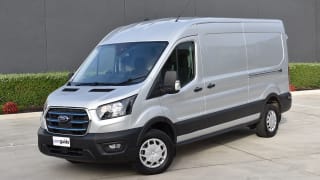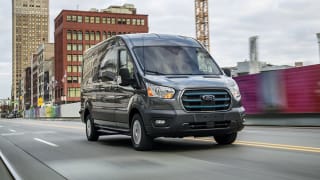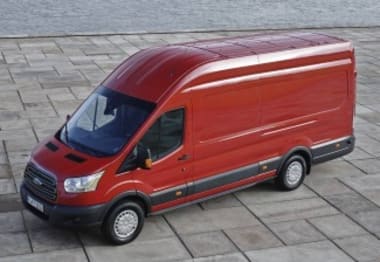
What's on this page
Ford Transit 2016
The 2016 Ford Transit carries a braked towing capacity of up to 3500 Kg, but check to ensure this applies to the configuration you're considering.
Ford Transit News

Mega $35,000 discount on electric workhorse! Price slashed on Ford e-Transit as the Blue Oval struggles to clear old stock of its LDV eDeliver 9 and Mercedes-Benz eSprinter rival
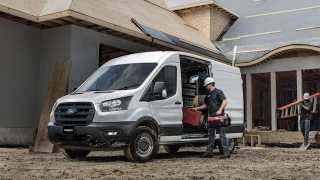
2024 Ford Transit van priced for Australia: Improved towing capacity and cabin tech for more expensive LDV Deliver 9 and Volkswagen Crafter rival

Next-gen Ford Transit Custom van arrival approaching as Blue Oval confirms some local specifications for Toyota HiAce rival

Are commercial vehicles like the Mercedes eVito and the LDV eDeliver 9 going to launch the electric car revolution? - Opinion

Best 4x4, off-roaders and light-commercial vehicles arriving in 2023

Best electric cars arriving in 2023

Ford Australia then and now: 10 years on from the day Ford announced the end of Australian manufacturing and changed our car industry forever

Ford Australia taking it slow with rolling out E-Transit electric van options, still believes diesel will dominate
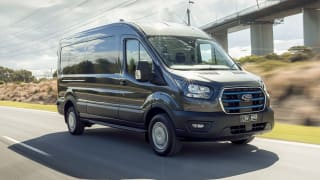
Do tradies dream of electric vans? 2023 Ford E-Transit EV pricing and specs place it as Ford's most expensive model
Ford Transit 2016 Q&As
Check out real-world situations relating to the Ford Transit here, particularly what our experts have to say about them.
-
How can I keep my 1997 Ford Transit Winnebago from feeling sluggish?
In 1997, the Ford Transit was offered with a pair of diesel engines and a petrol engine. But the most powerful of them (the petrol) could muster up just 83kW, which, combined with the weight of the vehicle (around 1600kg) plus the weight of the camper conversion (maybe another tonne with full water tanks etc), equals paltry performance and acceleration.
The simplest thing to do is make sure the engine is tuned to its absolute best. But even then, you’re fighting an uphill (literally) battle thanks to all that mass, not to mention the appalling aerodynamics of a campervan. If you don’t mind spending a lot more money, you could upgrade the engine and transmission to a more modern one but, at that point, you’re probably better off buying a newer van altogether.
Maybe in 1997 life was quite a bit slower and your vehicle wasn’t such a mobile roadblock. That said, plenty of modern day caravaners are happy to sit at 80 or 90km/h, so maybe you just need to find the right mindset and become a bit more Zen with your camper. Of course, even if you do manage that, some driving tasks such as overtaking and merging into traffic will require plenty of forward planning and understanding from other motorists.
Show more -
Am I able to tow a car behind my Ford Transit motor-home?
The crucial number here is the towing capacity of the Transit. This model ranged form 2000kg to 2750kg (depending on body and wheelbase) so a Daihatsu car shouldn't take you anywhere near that limit. That, of course, is if you flat-tow the Daihatsu behind the motor-home. If, however, you tow the car on a trailer, then you might (depending on the trailer's size and construction) find you're getting close to that limit in some circumstances.
The other problems will be the same ones faced by anybody who tows a decent sized load; wear and tear on the mechanical components and the sheer cost of fuel, particularly diesel.
Show more -
Does the 2003 Ford Transit have a timing chain or cam belt?
The model you've nominated has a timing chain, which, in theory, should be good for the life of the engine. However, that's not always the case, and some specialists recommend changing the timing chain at intervals of 200,000km. That is still a pretty decent innings for a hard-working vehicle like a Transit and is longer than the change interval for most engines with toothed rubber timing belts.
Show more -
2017 Ford Transit minibus cutting out when moving out of junctions
You’ve gone down the right path by having the vehicle scanned first, and even though no fault codes were revealed, that doesn’t mean it was a waste of time. In some cases, a mechanic experienced in a particular make and model will know that a fault with no code is caused by a specific part or piece of software. LS1 Holden V8s, for instance can experience a misfire with no code showing up. In that case, an experienced LS1 mechanic will go straight to the spark plugs as the cause.
So the best advice is to find a Ford Transit specialist as this problem has almost certainly occurred before to somebody else. Be aware, too, that Transits built between September 2014 and January 2015 were subject to a recall to replace a batch of faulty fuel injectors which were causing the precise symptoms you’ve noted. Ford believed the problem was solved for vehicles built after January 2015 (including yours) but it’s worth checking since it was a big enough problem for Ford Australia to issue a fleet-wide recall.
Show more
Ford Transit 2016 Dimensions
Dimensions for the 2016 Ford Transit are dependent on which body type is chosen. The maximum width and height is 2224mm x 2785mm and can vary on the basis of model.

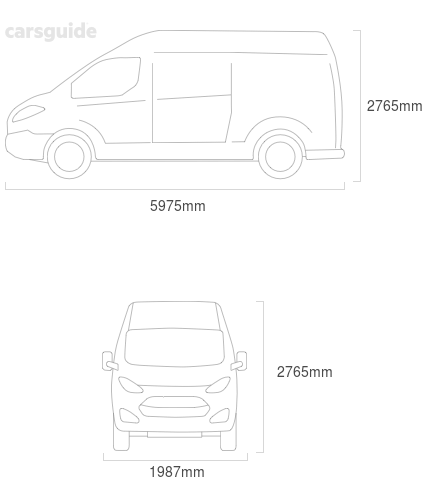
| Ford Transit Model | Body Type | Height x Width x Length | Ground Clearance | |
|---|---|---|---|---|
| 350L LWB High Roof | Commercial | 2785x1987x5771 mm | 118 mm | |
| 350L (LWB) RWD Mid Roof | Commercial | 2547x2112x5981 mm | 118 mm | |
| 350e LWB Jumbo (SRW) | Commercial | 2765x1987x5975 mm | 118 mm | |
| 470E LWB Jumbo (DRW) | Commercial | 2781x2224x5975 mm | 119 mm | |
| 12 Seat | People mover | 2369x1974x5680 mm | 100 mm | |
| 410L LWB 12 Seat | People mover | 2547x2094x5981 mm | 154 mm | |
Ford Transit 2016 Price and Specs
Pricing guides

| Ford Transit Model | Body Type | Specs | Price from | Price to | |
|---|---|---|---|---|---|
| 350E LWB Jumbo (SRW) | Commercial | 2.2L Diesel 6 SP MAN | $36,190 | $43,120 | |
| 350L (LWB) FWD Mid Roof | Commercial | 2.0L Diesel 6 SP AUTO | — | — | |
| 350L (LWB) RWD Mid Roof | Commercial | 2.2L Diesel 6 SP MAN | — | — | |
| 350L LWB High Roof | Commercial | 2.2L Diesel 6 SP MAN | $33,000 | $39,270 | |
| 12 Seat | People mover | 2.2L Diesel 6 SP MAN | — | — | |
| 410L LWB 12 Seat | People mover | 2.2L Diesel 6 SP MAN | — | — | |
Ford Transit 2016 Towing capacity
The Ford Transit’s towing capacity ranges from 1500kg to 3500kg. Some models also offer heavy-duty or towing option packs which can increase towing capacity, as well as options which can hamper towing capacity. Towing capacities can vary wildly on a large number of factors. These include engine, transmission, model, and options chosen. Always check with the manufacturer or in your vehicles handbook before attempting to tow anything.
| Ford Transit Model | Body Type | Specs | Braked Capacity | |
|---|---|---|---|---|
| 350L (LWB) RWD Mid Roof | Commercial | 2.2L,Diesel,6 SP MAN | 2750kg | |
| 350L LWB MID Roof | Commercial | 2.2L,Diesel,6 SP MAN | 2750kg | |
| 350L LWB High Roof | Commercial | 2.2L,Diesel,6 SP MAN | 2750kg | |
| 350E LWB Jumbo (srw) | Commercial | 2.2L,Diesel,6 SP MAN | 2750kg | |
| 12 Seat | People mover | 2.2L,Diesel,6 SP MAN | 1500kg | |
| 410L LWB 12 Seat | People mover | 2.2L,Diesel,6 SP MAN | 2500kg | |
Ford Transit 2016 Wheel size
Wheel size for the 2016 Ford Transit will vary depending on model chosen, although keep in mind that many manufacturers offer alternate wheel sizes as options on many models.The wheel size available will alter the range of tyres available to be fitted. Standard wheel sizes on the Ford Transit vary from 16x5.5 inches to 16x6 inches.
| Ford Transit Model | Body Type | Front Tyre Size | Front Rim | Rear Tyre Size | Rear Rim | |
|---|---|---|---|---|---|---|
| 350L LWB High Roof | Commercial | 235x65 R16 | 16x6.5 inches | 235x65 R16 | 16x6.5 inches | |
| 350L (LWB) RWD Mid Roof | Commercial | 215x65 R16 | 16x6.5 inches | 215x65 R16 | 16x6.5 inches | |
| 350e LWB Jumbo (SRW) | Commercial | 235x65 R16 | 16x6.5 inches | 235x65 R16 | 16x6.5 inches | |
| 470E LWB Jumbo (DRW) | Commercial | 195x75 R16 | 16x6 inches | 195x75 R16 | 16x6 inches | |
| 12 Seat | People mover | 215x75 R16 | 16x5.5 inches | 215x75 R16 | 16x5.5 inches | |
| 410L LWB 12 Seat | People mover | 235x65 R16 | 16x6.5 inches | 235x65 R16 | 16x6.5 inches | |
Ford Transit 2016 Fuel consumption
Fuel consumption for the 2016 Ford Transit is dependent on the type of engine, transmission, or model chosen. The Ford Transit is available with the following fuel type: Diesel.
| Ford Transit Model | Body Type | Specs | Fuel Consumption | |
|---|---|---|---|---|
| 350E LWB Jumbo (srw) | Commercial | 2.2L,Diesel,6 SP MAN | 9.5L/100km | |
| 350e LWB Jumbo (SRW) | Commercial | 2.2L,Diesel,6 SP MAN | 9.5L/100km | |
| 12 Seat | People mover | 2.2L,Diesel,6 SP MAN | 7.9L/100km | |
| 410L LWB 12 Seat | People mover | 2.2L,Diesel,6 SP MAN | — | |


